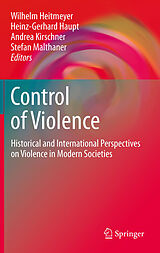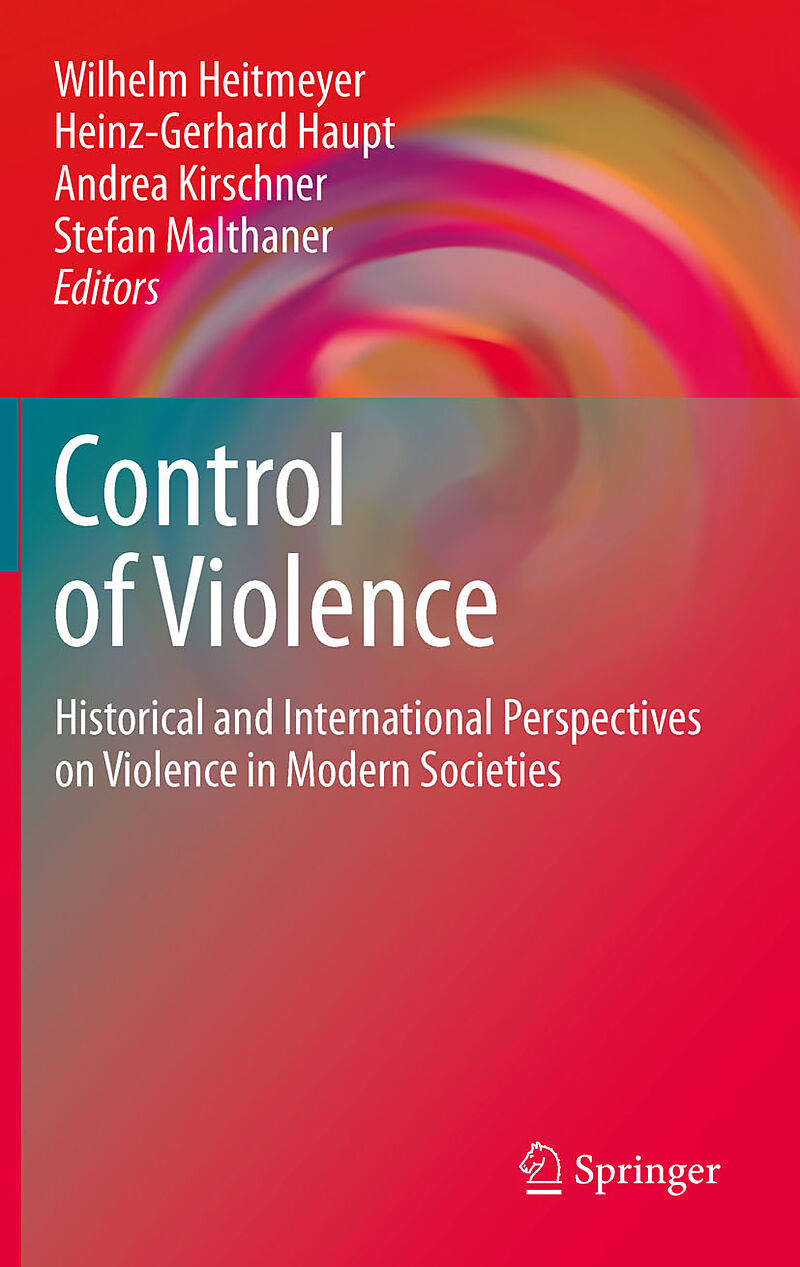Control of Violence
Einband:
E-Book (pdf)
EAN:
9781441903839
Autor:
Wilhelm Heitmeyer, Heinz-Gerhard Haupt, Stefan Malthaner, Andrea Kirschner
Herausgeber:
Springer
Erscheinungsdatum:
04.11.2010
Modern societies are increasingly confronted with forms of violence that appear unpredictable and uncontrollable. Are the existing control regimes such as police, state surveillance institutions, and legal systems able to effectively contain phenomena such as school shootings, terrorism, or violence in fragile states, and what would help them become more effective? What is the relationship between state rule and self-control in limiting violence? Taking an historically and internationally comparative perspective, the contributors to this innovative book examine these violent phenomena as well as the preconditions and mechanisms of their control. Taking into consideration the fundamentally ambivalent character of control, they explore how institutions and strategies of control retroact on and thus re-shape societies. Moreover, they address general aspects of violence control in modern societies such as the concept of individual self-control, the impact of changing social institutions and the role of religion. The contributions to this volume explore violence on the micro-, meso-, and macro-levels of social organization, creating a cohesive theoretical framework for understanding violence on each of these levels. Control of Violence in Modern Societies will be of great interest to researchers studying violence, particularly to those studying the phenomenon in a global context, be it from a criminological, a sociological or from a public health perspective.
Autorentext
Wilhelm Heitmeyer (Dr. phil.) is Professor of Socialization and Director of the Institute for Interdisciplinary Research on Conflict and Violence at Bielefeld University. His research interests concentrate on violence, social disintegration, right-wing extremism, and ethnic-cultural conflicts. His publications include International Handbook of Violence Research (co-edited with John Hagan); Rechtsextremistische Orientierungen bei Jugendlichen [Right-Wing Extremism Among Young People] (1987); Gewalt [Violence] (1995); Bedrohte Stadtgesellschaften [Urban Societies Under Threat] (co-edited with Reimund Anhut) (2000). He is Editor-in Chief of the International Journal of Conflict and Violence (with D. Massey et al.). He is organizer of the international research group "Control of Violence" at the Center for Interdisciplinary Research (ZiF), Bielefeld University (with Heinz Gerhard-Haupt/ Bielefeld, Florence). Heinz-Gerhard Haupt (Dr. phil.) is Professor of Social History at Bielefeld University and Head of the department of history and civilization at the European University Institute in Florence, Italy. His work focuses on social History and political History of Modern Europe, Methodology of Comparative History. His current research projects encompass History of Political Violence in 19th and 20th Century Europe, History of Consumption in 19th and 20th Century Europe, History of Social Movements and Classes: The First of May in Europe after 1945, Comparative History of European Nationalism: Nation and Religion in 19th and 20th Century. Recent publications include Neue Politikgeschichte [New political history](with Ute Frevert, eds.) (2005); Exklusion und Partizipation [Exclusion and particpiation] (with C. Gusy, Eds.); Terrorismus in der Bundesrepublik: Medien, Staat und Subkulturen in den 1970er Jahren [Terrorism in the Federal Republic ofGermany: Media, state, and subcultures] (with K. Weinhauer and J. Requate, Eds.) (2006). He is organizer of the international research group "Control of Violence" at the Center for Interdisciplinary Research (ZiF), Bielefeld University (with Wilhelm Heitmeyer/ Bielefeld).
Zusammenfassung
The Control of Violence in Modern Society, starts from the hypothesis that in modern society we will face an increasing loss of control over certain phenomena of violence. This leads to unpredictable escalations and violence can no longer be contained adequately by the relevant control regimes, such as police, state surveillance institutions, national repression apparatuses and international law. However, before investigating this hypothesis from an internationally and historically comparative perspective, the terms and "tools" for this undertaking have to be rendered more precisely. Since both "control" and "violence" are all but clear-cut terms but rather highly debatable and contested concepts that may take multiple connotations. The main question is whether an increase in certain forms of violence can be explained by the failure or, in turn, "overeffectiveness" of certain control mechanisms. It is asked, for instance, which contribution religion can make to limit violence and, in turn, which destructive potential religion might have in its fundamentalist form. Moreover, the concept of individual self-control as well as social institutions and strategies of collective disengagement and de-radicalization are investigated with regard to their potential for controlling violence. The Control of Violence in Modern Society concludes with a re-examination of the hypothesis of a loss of control by specifying in what cases and under which circumstances we can speak of a loss of control over violence.
Inhalt
1. Theoretical and analytical framework 2. Control and loss of control in an historical perspective Policining youth protests and juvenile delinquency in Germany from the 1950s until 1980s
Anarchist terrorism in imperial Germany and third Republic France
Deescalation by Communication? Dealing with Left-Wing Terrorism in the 1970s and 1980s
Ethnic riots in situations of loss of control: regime change, civil war and revolution as opportunity structures for anti-Jewish violence in 19-20th century Europe
Control of violence by gun-control. Concepts and activities in the German Empire 1871 1914
Loss of Control over Small-Group Clandestine Violence: The Case of German Terrorism in the Long Twentieth-Century
Making war and crafting peace in contemporary Africa
The neglected significance of skill formation in control of violence
Violence control beyond the state? The case of DR Congo
"You can't be donated power": Altruistic Intervention, Political Violence, and Post-War Reconstruction the role of 'external' actors in the control of violence 3. Multidisciplinary perspectives on violence Nature of Violence
The modernity of violence: decivilizing processes
Giving an end to violence
Emerging evidence for the theory of low-status compensation and its relationship to violence
4. The Micro-Level: School-Shootings
School Shootings: Perceived losses of control attempts to regain control
School violence and its control in the USA and Germany since the 1950s
School shootings: Specific problems of control
Prevention, Intervention and Coping with School Shootings (reprint)
5. The Meso-Level: Terrorism Local roots and transnationalism of 'Islamist'terrorism
Out of control? Explaining terrorist violence from a Jihadi perspective
Transformations of terrorism. The performative character of political violence.
The radical milieu: pathways to joining terrorist groups
The Grotesque Body and Mystical Conquest: The Case of Shi'i Cult of Martyrdom
6. The Macro Level: Violence in fragile states Modern Barbarism and the propects of civilization. Eliasion themes in an African context Controlling violence in the failed state: An examination of the UN's disarmament, demobilization and reintegration
Using fuel to put out a fire? Violence control in…

Leider konnten wir für diesen Artikel keine Preise ermitteln ...
billigbuch.ch sucht jetzt für Sie die besten Angebote ...
Die aktuellen Verkaufspreise von 6 Onlineshops werden in Realtime abgefragt.
Sie können das gewünschte Produkt anschliessend direkt beim Anbieter Ihrer Wahl bestellen.
Loading...
Die aktuellen Verkaufspreise von 6 Onlineshops werden in Realtime abgefragt.
Sie können das gewünschte Produkt anschliessend direkt beim Anbieter Ihrer Wahl bestellen.
| # | Onlineshop | Preis CHF | Versand CHF | Total CHF | ||
|---|---|---|---|---|---|---|
| 1 | Seller | 0.00 | 0.00 | 0.00 |
